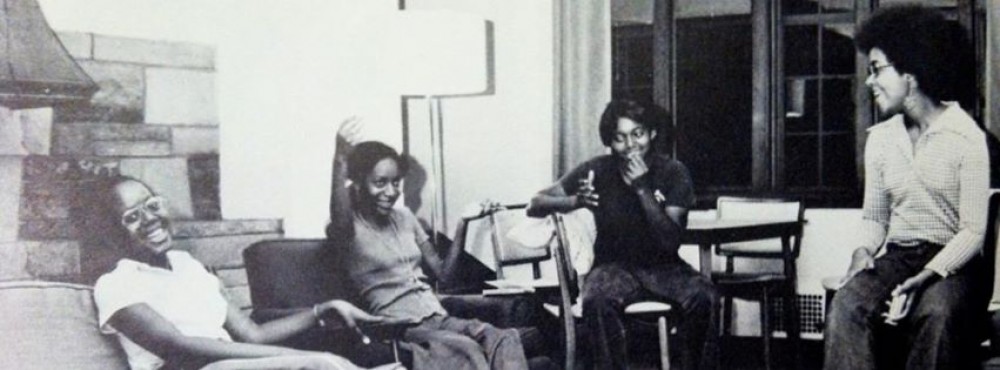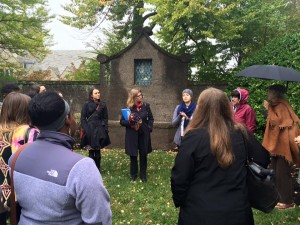by Monica Mercado
This weekend, the Black at Bryn Mawr Fall Workshop will explore the role that race plays in students’ own and others’ identities on campus. With summer research funding from the Provost’s Office, workshop leader Grace Pusey ’15 has organized an intensive two-day reading, writing, and discussion-based workshop for current undergrads, supported by Bryn Mawr’s Pensby Center and The Albert M. Greenfield Digital Center for the History of Women’s Education.
When Grace proposed the workshop to us, she outlined a number of objectives that might use the Black at Bryn Mawr project as a point of departure, including:
- learning to recognize how racial power dynamics impact themselves and others on campus;
- exploring concepts of power, privilege, and oppression related to race;
- strengthening competencies in reading, writing, and discussing critical theory; and,
- deepening students’ understanding of how history can be used as a tool for social justice on campus and beyond.
These goals will be accomplished through a blend of experiential and text-based learning activities. Unable to participate? We’ll be using this space to reflect on the workshop in the weeks ahead, but check out the syllabus, after the jump, and read along with us.
Black at Bryn Mawr Fall Workshop Agenda
Friday, October 16 – Saturday, October 17, 2015
Day 1 | Friday, October 16
Participants will convene for introductions and take the Black at Bryn Mawr campus walking tour, designed to illuminate historical sites of racial conflict and conversation on campus, followed by reflective discussion.
12:00 PM Welcome & Workshop Overview Quita Woodward Room — lunch will be served.
1:30 PM Black at Bryn Mawr Tour (rain or shine — please dress appropriately!)
3:00 PM Reflection & Discussion
4:30 PM Adjournment
Interim | Workshop Writing Assignment
Participants will be asked to keep a 24-hour record of every instance in which they assign race to themselves and to others, including instances in which they may resist being assigned race, feel perplexed, or encounter ambiguity. Excerpts from critical theoretical texts which complement this activity will be assigned. Participants will be expected to read and annotate these texts carefully in order to contribute to animated discussion on Day Two.
Day 2 | Saturday, October 17
9:30 AM Breakfast at Pensby Center & Critical Theory Discussion
12:00 PM Lunch
1:00 PM “What’s Next?”: History & Social Justice Discussion
2:30 PM Closing Activity
3:00 PM Adjournment
The workshop will close with a forward-looking conversation about collective memory and using history as a tool for social justice. Workshop participants are encouraged to reflect on their experiences in a short essay to be published on the Black at Bryn Mawr blog.
Workshop Reading List
Louis Althusser, “Ideology and Ideological State Apparatuses,” in A Critical and Cultural Theory Reader (eds. Anthony Easthope & Kate McGowan, Toronto: University of Toronto Press, 1992: pp. 50-58.)
Laurie A. Finke, “Pedagogy of the Depressed: Feminism, Poststructuralism, and Pedagogical Practice,” in Teaching Contemporary Theory to Undergraduates (eds. Diane Sadoff & William Cain, New York, NY: The Modern Language Association of America, 1994: pp. 154-168.)
Evelyn Brooks Higginbotham, “African-American Women’s History and the Metalanguage of Race,” Signs: Journal of Women in Culture and Society Vol. 17, No. 2 (Winter 1992): pp. 251-274.
Charles W. Mills, “White Ignorance,” in Philosophy and Race: Race and Epistemologies of Ignorance (eds. Shannon Sullivan & Nancy Tuana, Ithaca, NY: State University of New York Press, 2007: pp. 13-38.)

